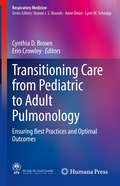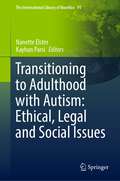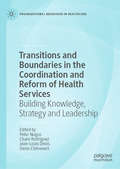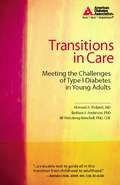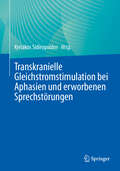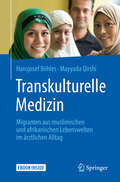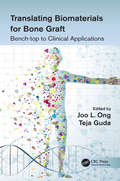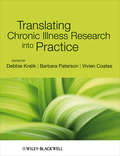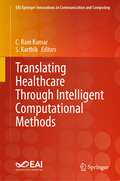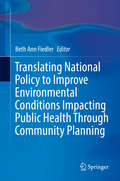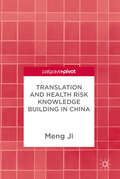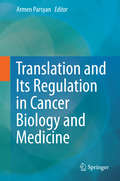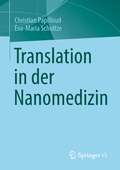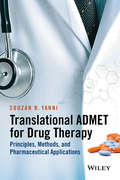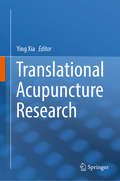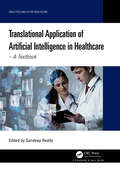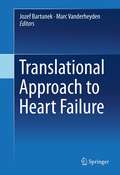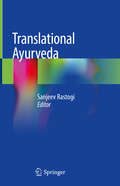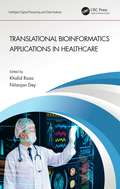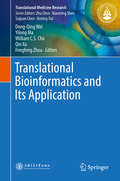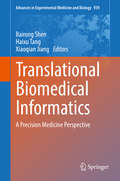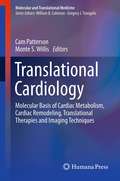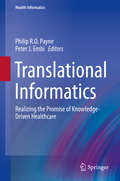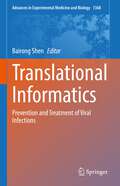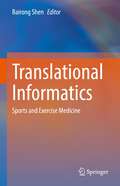- Table View
- List View
Transitioning Care from Pediatric to Adult Pulmonology: Ensuring Best Practices and Optimal Outcomes (Respiratory Medicine)
by Cynthia D. Brown Erin CrowleyThis book addresses an unmet need in the care of adolescents and young adults with lung disease. The increasing survival of young adults with childhood-onset pulmonary conditions is a testament to major advances in treatments and health care delivery. With the increase in survival of children with chronic respiratory conditions, there is a need for formalized transition programs to integrate adolescents and young adults into the adult model of care. This book helps fill gaps in knowledge to best achieve that initiative.This book takes a comprehensive approach to transition care in pulmonary medicine by satisfying the following objectives: 1) Understand the barriers and developmental challenges in the transition from pediatric to adult care for patients with chronic childhood-onset pulmonary disease; 2) Learn about successful evidence based transition models in pulmonary disease populations, focusing on key process and outcome measures for success; and 3) Develop knowledge to design, implement, and measure a transition program based on evidence and expert opinion. In the first section, the book outlines general principles of transition care that are applicable to all patients regardless of underlying disease process and describe best practices for performing necessary research in transition care. In the second section, the book explores psychosocial factors known to play a role in affecting transition outcomes, including parental support, psychological development, and socioeconomic factors. In the final section, transition outcomes and best practices in specific respiratory diseases are outlined. With a focus on populations with chronic pulmonary disease, this book highlights the challenges and barriers of transition, reviews model systems to understand the essential components of a transition program, and provides evidence-based information to navigate these barriers and achieve successful outcomes during transition to adulthood.This is an ideal guide for pediatric and adult pulmonary providers caring for patients who are transition age, as well as multidisciplinary care team members who work with these providers in care models on transition projects to improve the transition process.
Transitioning to Adulthood with Autism: Ethical, Legal and Social Issues (The International Library of Bioethics #91)
by Nanette Elster Kayhan ParsiThis book offers the first ever book-length treatment of the topic of transitioning from adolescence to adulthood with autism and the attendant ethical, legal and social issues for the individual as well as caregivers and professionals. It features experts in a variety of areas (law, bioethics, philosophy, pediatrics, neurology, medicine, psychology, special education, social work, employment, civic participation, social media) who provide commentary on these areas and the relevant ethical/legal/social challenges young autistic adults face in these different areas. This is an indispensable read for educators, therapists, and other professionals who work in transition with young autistic adults.
Transitions and Boundaries in the Coordination and Reform of Health Services: Building Knowledge, Strategy and Leadership (Organizational Behaviour in Healthcare)
by Jean-Louis Denis Peter Nugus Charo Rodriguez Denis ChênevertHealth systems worldwide are grappling with the challenge of coordinating difference in an increasingly complex care environment. In response this book features the latest research on organizational studies in healthcare and explores the relationship between strategic and organic change and what this means for the way we organize health work. Focusing on the complexity of healthcare environments, it discusses the need to cross professional and organizational boundaries. Specifically, this book focuses on the implications for health systems in the way that they continue to balance planning and intervention with organic learning systems. Comprising the best contributions from the 2018 Conference on Organizational Behaviour in Health Care (OBHC), this book is an important resource for healthcare researchers, as well as policy-makers and managers within the industry. Contributors explore the extent to which healthcare is codified through empirical analysis of practical interventions and conceptual debate.
Transitions in Care
by Barbara J. Anderson Howard A. Wolpert Michael A. HarrisProviding care for a young adult with type 1 diabetes during this stage can be difficult as well. Transitions in Care serves as a coaching manual for health care providers and parents, and as a guide to self-care and independence for young adults with diabetes. It demystifies a complicated period in a life with type 1 diabetes and makes the passage to adulthood easier for everyone involved.
Transkranielle Gleichstromstimulation bei Aphasien und erworbenen Sprechstörungen
by Kyriakos SidiropoulosDieses Buch bietet eine praktische Einführung in die Methodik der transkraniellen Gleichstromstimulation (tDCS) und fasst aktuelle Forschungsergebnisse dieser Stimulationsmethode bei Aphasien und erworbenen Sprechstörungen zusammen. Die Modulation der kortikalen Erregbarkeit ergänzt konventionelle logopädische Interventionen, um die sprachlichen Fähigkeiten der Betroffenen zusätzlich zu fördern und ihre Lebensqualität zu verbessern. Das Werk richtet sich an Fachleute aus Neurologie und Logopädie, Neurowissenschaft und Rehabilitationsmedizin sowie an Forscher der Neuro- und Sprachwissenschaft. Leser mit wissenschaftlichem oder klinischem Hintergrund profitieren von der detaillierten Beschreibung verschiedener Protokolle und der Diskussion der zentralen Forschungsergebnisse, die zur Optimierung therapeutischer Ansätze beitragen. Einige Kapitel wurden aus dem Englischen mit Hilfe von künstlicher Intelligenz übersetzt. Da die anschließende Überprüfung hauptsächlich im Hinblick auf inhaltliche Gesichtspunkte erfolgte, kann sich der Text des Buches stilistisch von einer konventionellen Übersetzung unterscheiden.
Transkulturelle Medizin
by Hansjosef Böhles Mayyada QirshiDas Buch behandelt die wesentlichen kulturellen Eigenheiten von Patienten aus dem arabisch-islamischen und afrikanischen Kulturkreis, Erkrankungen und Einstellungen dazu mit dem Akzent auf Geflüchteten, Asylsuchenden und Migranten, einschließlich Kindern.Die Autoren klären über Missverständnisse auf, beseitigen Unsicherheiten und zeigen die Auswirkungen der kulturellen Diversität auf den Umgang mit Ärzten und Gesundheitsfachberufen im hiesigen Gesundheitssystem. Geprägt von jahrelanger Erfahrung mit Flüchtlingen aus unterschiedlichen Lebenswelten, schärfen die Autoren Ihr Wissen und Bewusstsein für die Kulturunterschiede und bahnen mit hilfreichen Anregungen einen Weg zu einem erfolgreichen, empathischen Arzt-Patientenverhältnis.
Translating Biomaterials for Bone Graft: Bench-top to Clinical Applications
by Joo L. Ong Teja GudaTranslating Biomaterials for Bone Graft: Bench-top to Clinical Applications brings together the current translational research in bone tissue engineering, from design to application – from materials, drugs and biologic delivery used for bone graft applications to pre-clinical and clinical considerations. The book also discusses the regulatory approval pathways, which involves consideration of the class of devices; whether they are similar to existing solutions, minimal manipulation of donor tissue or completely novel materials, drugs and biologics. These considerations drive the ability to successfully transition the latest generations of bone graft materials into the clinics. Chapters come from materials scientists, clinicians, researchers, and consultants and provide a holistic understanding of the field. As such, the book is a state-of-the-art reference to bone therapies and should appeal to clinicians, scientists, as well as students interested in the current research and/or practices in the field of bone regeneration and restoration.
Translating Chronic Illness Research into Practice
by Debbie Kralik Barbara Paterson Vivien CoatesTranslating Chronic Illness Research into Practice presents recent developments in chronic illness research and their implications for clinical practice. It delivers both a synthesis and a critique of current chronic illness research and its applications to chronic illness prevention, treatment and care. It promotes advances in knowledge about chronic illness, including discussion of the future directions for chronic illness research and gaps in present knowledge about effective chronic illness prevention, treatment and care. Key features: Contains contributions from internationally renowned researchers in chronic illness Focuses on three key concepts, translating research into practice, chronic illness and practice, and bridges the boundaries between them Is applicable to an international, multi-disciplinary readership For researchers and practitioners across health disciplines
Translating Healthcare Through Intelligent Computational Methods (EAI/Springer Innovations in Communication and Computing)
by C. Ram Kumar S. KarthikThis book provides information on interdependencies of medicine and telecommunications engineering and how Covid exemplifies how the two must rely on each other to effectively function in this era. The book discusses new techniques for medical service improvisation such as clear cut views on medical technologies. The authors provide chapters on processing of medical amenities using medical images, the importance of data and information technology in medicine, and machine learning and artificial intelligence in healthcare. Authors include researchers, academics, and professionals in the field of communications engineering with a variety of perspectives.
Translating National Policy to Improve Environmental Conditions Impacting Public Health Through Community Planning
by Beth Ann FiedlerThis first-of-its-kind volume traces rarely explored links between public policy, the state of the environment, and key issues in public health, with recommendations for addressing longstanding intractable problems. Experts across diverse professions use their wide knowledge and experience to discuss hunger and food sustainability, land use, chronic and communicable diseases, child mortality, and global water quality. Interventions described are varied as well, from green technology breakthroughs to regulatory accountability, innovative urban planning and community policing programs. Chapters build and expand on each other’s themes inspiring deeper understanding and critical thinking that further prompts readers to develop practical solutions leading to improvements in planetary and population health outcomes. Included in the coverage:· The challenge of implementing macroeconomic policy in an increasingly microeconomic world· Green aid flows: trends and opportunities for developing countries· Planning healthy communities: abating preventable chronic diseases· Foundations of community health: planning access to public facilities · International changes in environmental conditions and their personal health consequences Translating National Policy to Improve Environmental Conditions Impacting Public Health is developed for educators, students, and policymakers to generate awareness and review options to help create change in their communities. Federal agencies such as the Department of Health and Human Services, the National Institutes of Health, the EPA, and Housing and Urban Development will also find it salient.
Translation and Health Risk Knowledge Building in China
by Meng JiThis pivot considers the dissemination of public health terms in Chinese scientific research and printed media. Bringing together quantitative and qualitative analysis from corpus linguistics, translation studies, contrastive linguistics to bear on the study of specialised public health translation, it provides key insights into the translation of key public health policy materials produced by authoritative international health agencies like the World Health Organisation (WHO). The study of the acceptance, assimilation and update of translated health risk terms is embedded within corpus translation studies, one of the most dynamic areas of applied translation studies. This study deploys large-scale data bases of scientific publications and printed media materials to trace and analyse the use of translated public health terms and linguistic synonyms by Chinese researchers and media. It also highlights the limits of research investment on critical public health topics such as health financial risks and considers worldwide concerns about the use of accurate and appropriate terminology in specialized fields of knowledge, and the implications for scholarly research, translator training and professional practice.
Translation and Its Regulation in Cancer Biology and Medicine
by Armen ParsyanThis book, for the first time, comprehensively assembles and analyzes a large body of information on the role of the fundamental mechanism of the protein biosynthesis pathway, translation, in cancer biology. It systematically explores the function of the translation machinery and its regulation, including cell signaling, in the development, maintenance and progression of human cancer. The work presented here unveils the tremendous potential and applications of this vast and exciting branch of genetic, biochemical and molecular science in cancer medicine and drug development. Chapters contributed by experts in the field take the reader on a journey that starts with a dissection of the translation machinery and its regulation in norm and cancer. Later chapters characterize etiological and pathogenetic roles that translation plays in specific cancer types. Various aspects of diagnostic, prognostic and therapeutic significance of the translation machinery and its control in cancer are discussed. Readers will discover the importance of the process of translation and its regulatory mechanisms in physiology and cancer biology. The chapters and the numerous illustrations included here were contributed by expert scientists and clinicians from renowned academic and clinical establishments in Canada, the United States of America, the United Kingdom, Italy, France, Belgium, Spain, Germany and Australia. The book conveys information and knowledge that may interest a broad range of students and scholars ranging from basic scientists to clinicians and drug developers seeking to better understand the protein synthesis and its aberrations in cancer biology and cancer medicine.
Translation in der Nanomedizin
by Christian Papilloud Eva-Maria SchultzeAls Bereich der Entwicklung und Verwendung von Nanotechnologien zur Heilung von Krankheiten ist die Nanomedizin eng mit den Erwartungen auf die Verwirklichung des Potentials der Nanotechnologien zur Verbesserung der menschlichen Gesundheit einerseits und zur Gewährleistung des gesellschaftlichen Wohlstandes andererseits verbunden. Ziel dieser Rhetorik ist es, die Einbeziehung der Nanomedizin in die soziale Arbeit unterschiedlicher Akteure zu normalisieren. Die Translation in der Nanomedizin ist der Ausdruck, der eine solche Entwicklung bezeichnet.Auf der Grundlage der Theorie der Relation wird diese Translation empirisch mit Hilfe von Topic-Modell-Verfahren untersucht. Dabei zeigt sich, dass die Translation in der Nanomedizin, welche als Weg "par excellence" zur effizienteren Heilung von Patienten vorgesehen war, im Laufe der Zeit insbesondere zur Formalisierung des Verhältnisses zwischen Krankheiten und Menschen zum Zweck der Verdatung eines solchen Verhältnisses verwendet wird.
Translational ADMET for Drug Therapy
by Souzan B. YanniServing as a practical handbook about ADMET for drug therapy, this book presents effective technologies, methods, applications, data interpretation, and decision-making tactics for pharmaceutical and preclinical scientists. Chapters cover case studies and in vivo, in vitro, and computational tools for drug discovery and development, with new translational approaches to clinical drug investigations in various human populations. Illustrates ADME properties, from bedside to bench and bench to bedside, for the design of safe and effective medicine in human populations Provides examples that demonstrate the integration of in vitro, in vivo, and in silico data to address human PKPD and TKTD and help determine the proper therapeutic dosage Presents successful tools for evaluating drugs and covers current translational ADMET with regulatory guidelines Offers a hands-on manual for researchers and scientists to design and execute in vitro, in silico, preclinical, and clinical studies Includes discussion of IND / NDA filing and drug labeling to support drug registration and approval
Translational Acupuncture Research
by Ying XiaWritten by many scientists and clinicians from China, USA, Canada and other countries, this monograph discusses translational research on acupuncture. Besides general topics on acupuncture practice (e.g., different styles and techniques of acupuncture), topics include some refractory diseases such as chronic fatigue syndrome, Parkinson’s disease, cardiovascular dysfunction, chronic pain, post-concussion syndrome and post-traumatic stress disorder and cancer-related symptoms. The factors influencing acupuncture research are comprehensively addressed in the final chapter. This unique book provides a translational perspective on modern acupuncture for not only acupuncturists, but also neuroscientists, neurologists, and other clinicians. For medical students and undergraduate and graduate students majoring in biology, this book is an advanced course for learning the progress in alternative and complementary Medicine.
Translational Application of Artificial Intelligence in Healthcare: - A Textbook (Analytics and AI for Healthcare)
by Sandeep ReddyIn the era of 'Algorithmic Medicine', the integration of Artificial Intelligence (AI) in healthcare holds immense potential to address critical challenges faced by the industry. Drawing upon the expertise and experience of the authors in medicine, data science, medical informatics, administration, and entrepreneurship, this textbook goes beyond theoretical discussions to outline practical steps for transitioning AI from the experimental phase to real-time clinical integration. Using the Translational Science methodology, each chapter of the book concisely and clearly addresses the key issues associated with AI implementation in healthcare. Covering technical, clinical, ethical, regulatory, and legal considerations, the authors present evidence-based solutions and frameworks to overcome these challenges. Engaging case studies and a literature review of peer-reviewed studies and official documents from reputed organizations provide a balanced perspective, bridging the gap between AI research and actual clinical practice.
Translational Approach to Heart Failure
by Jozef Bartunek Marc VanderheydenThe refined pathophysiologal understanding of the heart failure syndrome together with the surge of new technological advances led to innovative medical and interventional treatment strategies improving the outcome of heart failure patients. However the complex interplay between the clinical presentation and the array of the interventions requires a coordinated multidisciplinary "heart team" approach involving various specialists in the cardiovascular field including clinicians, interventionalists, surgeons and cardiac intensivists. In this book, opinion leaders will review of state-of-the-art management of heart failure with particular emphasis on burning clinical questions and challenges faced by the heart team. New medical and interventional therapies for chronic and acute heart failure are addressed by bridging bench to bedside translation in science and technology into practical clinical application and guidance.
Translational Ayurveda
by Sanjeev RastogiTranslational Ayurveda is the implementation of translational medicine ideas taking into account Ayuraveda’s unique health care principles and their application in patient care. This book addresses various domains of Ayurveda, discussing its fundamentals and clinical practice in terms of the various modalities available, and offering deep insights into what is actually described in the classical Ayurveda texts. It also explores the public health impacts of such classical thoughts from a completely new angle.In Ayurveda, there are huge gaps between knowledge and its practical application. The book identifies these gaps to provide a new perspective on Ayurvedic wisdom in light of contemporary scientific advances.
Translational Bioinformatics Applications in Healthcare (Intelligent Signal Processing and Data Analysis)
by Nilanjan Dey Khalid RazaTranslational bioinformatics (TBI) involves development of storage, analytics, and advanced computational methods to harvest knowledge from voluminous biomedical and genomic data into 4P healthcare (proactive, predictive, preventive, and participatory). Translational Bioinformatics Applications in Healthcare offers a detailed overview on concepts of TBI, biological and clinical databases, clinical informatics, and pertinent real-case applications. It further illustrates recent advancements, tools, techniques, and applications of TBI in healthcare, including Internet of Things (IoT) potential, toxin databases, medical image analysis and telemedicine applications, analytics of COVID-19 CT images, viroinformatics and viral diseases, and COVID-19–related research. Covers recent technologies such as Blockchain, IoT, and Big data analytics in bioinformatics Presents the role of translational bioinformatic methods in the field of viroinformatics, as well as in drug development and repurposing Includes translational healthcare and NGS for clinical applications Illustrates translational medicine systems and their applications in better healthcare Explores medical image analysis with focus on CT images and novel coronavirus disease detection Aimed at researchers and graduate students in computational biology, data mining and knowledge discovery, algorithms and complexity, and interdisciplinary fields of studies, including bioinformatics, health-informatics, biostatistics, biomedical engineering, and viroinformatics. Khalid Raza is an Assistant Professor, the Department of Computer Science, Jamia Millia Islamia (Central University), New Delhi. His research interests include translational bioinformatics, computational intelligence methods and its applications in bioinformatics, viroinformatics, and health informatics. Nilanjan Dey is an Associate Professor, the Department of Computer Science and Engineering, JIS University, Kolkata, India. His research interests include medical imaging, machine learning, computer-aided diagnosis, and data mining.
Translational Bioinformatics and Its Application
by Qin Xu Dong-Qing Wei Yilong Ma William C. S. Cho Fengfeng ZhouThis book offers a detailed overview of translational bioinformatics together with real-case applications. Translational bioinformatics integrates the areas of basic bioinformatics, clinical informatics, statistical genetics and informatics in order to further our understanding of the molecular basis of diseases. By analyzing voluminous amounts of molecular and clinical data, it also provides clinical information, which can then be applied. Filling the gap between clinic research and informatics, the book is a valuable resource for human geneticists, clinicians, health educators and policy makers, as well as graduate students majoring in biology, biostatistics, and bioinformatics.
Translational Biomedical Informatics
by Bairong Shen Haixu Tang Xiaoqian JiangThis book introduces readers to essential methods and applications in translational biomedical informatics, which include biomedical big data, cloud computing and algorithms for understanding omics data, imaging data, electronic health records and public health data. The storage, retrieval, mining and knowledge discovery of biomedical big data will be among the key challenges for future translational research. The paradigm for precision medicine and healthcare needs to integratively analyze not only the data at the same level - e. g. different omics data at the molecular level - but also data from different levels - the molecular, cellular, tissue, clinical and public health level. This book discusses the following major aspects: the structure of cross-level data; clinical patient information and its shareability; and standardization and privacy. It offers a valuable guide for all biologists, biomedical informaticians and clinicians with an interest in Precision Medicine Informatics.
Translational Cardiology
by Cam Patterson Monte S. WillisTranslational Cardiology: Molecular Basis of Cardiac Metabolism, Cardiac Remodeling, Translational Therapies and Imaging Techniques provides an up-to-date introduction to the role circadian rhythms, cardiac plasticity, and mechanotransduction play in the heart, while at the same time introducing new developments in cellular, viral, and non-biologic therapies that are in the process of being developed. Importantly, the focus of this book is on topics that, due to their novelty, are largely not covered in the other major textbooks. A special emphasis is placed on the molecular basis of cardiac metabolism, new concepts in cardiac remodeling, and translational therapies and imaging techniques currently under development for clinical use. The chapters are written by experts from diverse clinical and biomedical research backgrounds. Translational Cardiology: Molecular Basis of Cardiac Metabolism, Cardiac Remodeling, Translational Therapies and Imaging Techniques simplifies the complexity of the molecular basis of disease by focusing on patient-oriented disease mechanisms and therapies and is of great value to a broad audience including physicians (e.g. cardiologists, cardiovascular surgeons, pathologists) as well as translational biomedical researchers in a wide range of disciplines.
Translational Informatics
by Philip R.O. Payne Peter J. EmbiIntegrative and translational methodologies and frameworks have transformed modern biomedical research and the delivery of clinical care. This shift has been manifested in a number of ways, including the rapid growth and increasing availability of high-throughput bio-molecular instrumentation and analysis platforms, innovative clinical research programs intended to accelerate knowledge translation, and initial efforts to deliver personalized healthcare informed by the genomic profiles of patients. A common theme of reports and publications concerned with such transformative changes in the biomedical and healthcare domains is concerned with the challenges and opportunities related to the collection, management, integration, analysis, and dissemination of large-scale, heterogeneous biomedical data sets. In particular, the absence of well-established and adopted theoretical and practical frameworks intended to address such needs is a major impediment to the realization of translational and knowledge-driven healthcare, in which the best possible scientific evidence is used to inform the care of every patient. In this vacuum, the development of integrative clinical or translational research paradigms is significantly limited by the propagation of both data and expertise silos. This book details for the first time the current state of this extremely potent area of healthcare innovation and policy and defines the interaction between clinical/translational science and biomedical informatics.
Translational Informatics: Prevention and Treatment of Viral Infections (Advances in Experimental Medicine and Biology #1368)
by Bairong ShenThis book introduces the translational informatics applied to most aspects of virus infection, including tracking of virus origin, detection and prevention of infection, drug discovery, and vaccine design as well as smart city-level monitoring and controlling of the virus epidemic by government. It covers the informatics for data mining and modelling at molecular, tissue/organ, individual, and population levels. The informatics for immunological mechanisms and the personalized prediction and treatment of infected patients are also summarized. The perspectives on the application of artificial intelligence to the prevention of virus outbreaks are also given. This book will be helpful to readers who are interested in prevention of virus infection, biomedical informatics, and artificial intelligence in medicine and healthcare.
Translational Informatics: Sports and Exercise Medicine (Advances In Experimental Medicine And Biology Ser. #1005)
by Bairong ShenThe book provides readers the informatics and data-driven models for the discovery of personalized excise prescriptions applied to different cases. Overdiagnosis or over-treatment often happened since the complex interaction among the lifestyle, genetic, and environmental factors. Sports and exercise are reported efficient to prevent or reduce the risk of diseases, but the interactions between sports/exercise and disease are personalized and complex. Translational informatics is a powerful paradigm and it promotes the transfer of big data, knowledge and models to the precision application of sports to prevent diseases. Sports and exercise may have different effects on diverse diseases including cancers, neurodegenerative disease, and cardiovascular diseases, etc. This book covers many modern informatics models such as ontologies, knowledge graphs, blockchain, participatory medicine, semantic artificial intelligence, big data modeling, and so on. It also describes the challenges for the sports and exercise medical data sharing and standardization, the privacy protection of data as well as the integration of data from genomic level to physiological phenotype level. This book will be helpful to the readers who are interesting in sports and exercise medicine, healthcare, big data modeling, artificial intelligence in medicine and healthcare.
